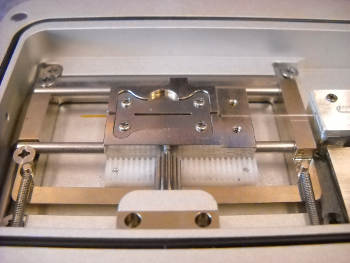Market leaders in temperature controlled microscopy, Linkam Scientific Instruments, report on the use of their innovative CAP500 heating stage for geological research at the new Sanya Institute of Deep-sea Science and Engineering (SIDSSE) of the Chinese Academy of Sciences.
 The Linkam CAP500 system can control up to 50mm of quartz capillary at high pressure (600bar) from -196°C to 500°C.
The Linkam CAP500 system can control up to 50mm of quartz capillary at high pressure (600bar) from -196°C to 500°C.
Founded in 1956, The Chinese Academy of Geological Sciences is devoted to scientific investigation and research on basic, hydro, environmental, and karst geology. Further areas of interest are exploration geophysics and geochemistry; rock and mineral analysis; and efficient mineral resources utilization. A new modern hydrothermal laboratory is being built as part of the new Sanya Institute of Deep-sea Science and Engineering (SIDSSE), a division of the Chinese Academy of Geological Sciences.
Dr I-Ming Chou, a leading scientist behind the creation of the SIDSSE laboratory, and his colleagues are using the CAP500 stage to conduct experimental studies of extreme deep-sea conditions. He said: "the sea floor is a frontier for current and future human exploration. The recent successful dive of manned submersible Jiaolong at the depth of 7062m was one of the major scientific achievements of China. This accomplishment provided us with great opportunities for exploring the sea floor, especially the hadal zones that have previously been inaccessible to us. This will facilitate important new research and establish hadal sciences in China. We will also be able to explore and study the life, environments, and geodynamics at the deepest part of the Earth's surface, as well as to formulate possible models for the geological processes that occurred or will occur beneath the sea floor."
To further their geological research the scientists are using the prototype Linkam CAP500 stage. The CAP500 system can control up to 50mm of quartz capillary at high pressure (600bar) from -196°C to 500°C. In relation to the stage Dr Chou said: "We are beta testing this system with a number of different labs at the moment. Sample temperatures are controlled using a T95 controller with a T95 LinkPad and LNP95 cooling system through Linksys32 temperature control and video capture software. A capillary tube of HPOC can be inserted into a channel (1mm wide and 0.6mm deep) of a silver block (20mm x 50mm). Optical cells have fused silica windows for the study of geological fluids. A small aperture through the centre of the stage, allows samples to be viewed with transmitted light while its design minimizes the temperature gradient along its length."
Dr Chou noted: "The simulated pressure-temperature conditions we can create using the CAP500 will cover hydrothermal vents, hadal zones, and trenches (from 1 to 400°C and up to 600bar). A major advantage of the high-pressure optical cells is the transparency of its windows. This allows the in situ observations and spectroscopic analyses of the samples, and continuous recording during experiments for later review. Using optical cells allows us to not only observe many geological processes at higher P-T conditions, but also characterize geological samples in the cells by using advanced spectroscopic tools, including Raman spectroscopy and synchrotron X-ray spectroscopy. Optical cells with fused silica windows are particularly suitable for the study of organic systems and for systems containing sulphur. Furthermore, fluid standards with known composition and pressure can be prepared in these types of cells for quantitative Raman analyses of either natural or synthetic fluids."
When asked about the stage, Dr Chou said: "the stage has the following advantages for the study of geological fluids at P-T conditions up to 500°C and 600bar: it has (1) fluid samples which are easy to load; (2) greater Raman signal intensity; (3) sample pressures which can be measured directly when the HPOC is used; and is (4) easy to operate; and (5) less expensive than other systems on the market."
Visit Linkam at www.linkam.co.uk and learn about the broad range of applications in the field of temperature-controlled microscopy.
About Linkam Scientific Instruments
Linkam develops and manufactures a broad range of heating and freezing stages for both OEM and end users to visualize and explore materials properties. Used in conjunction with light microscopes and other forms of spectroscopy, Linkam stages are found in thousands of laboratories worldwide with the most successful microscope heating stage, the THMS600, selling over 4,000 units alone. Linkam is the market leader in temperature controlled microscopy.